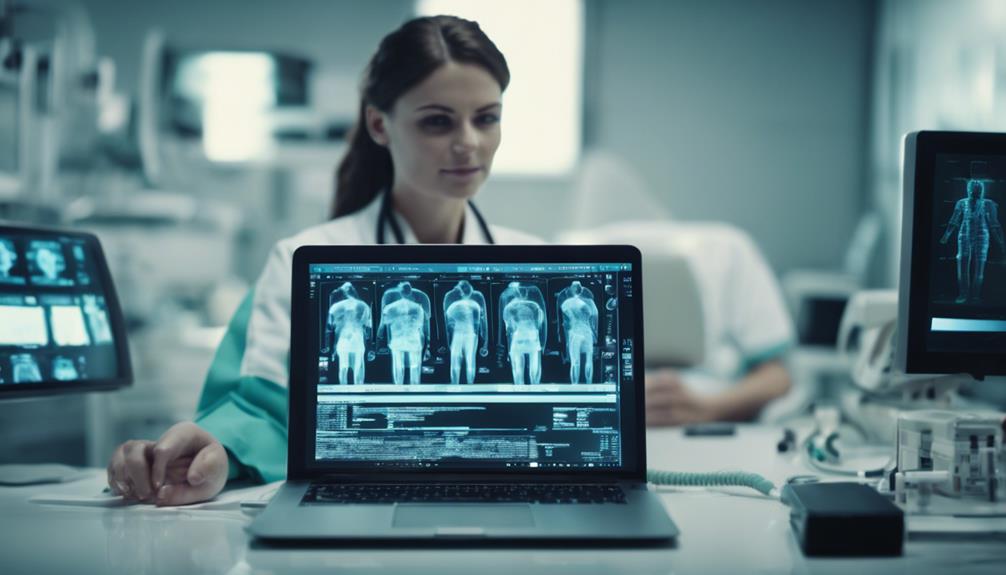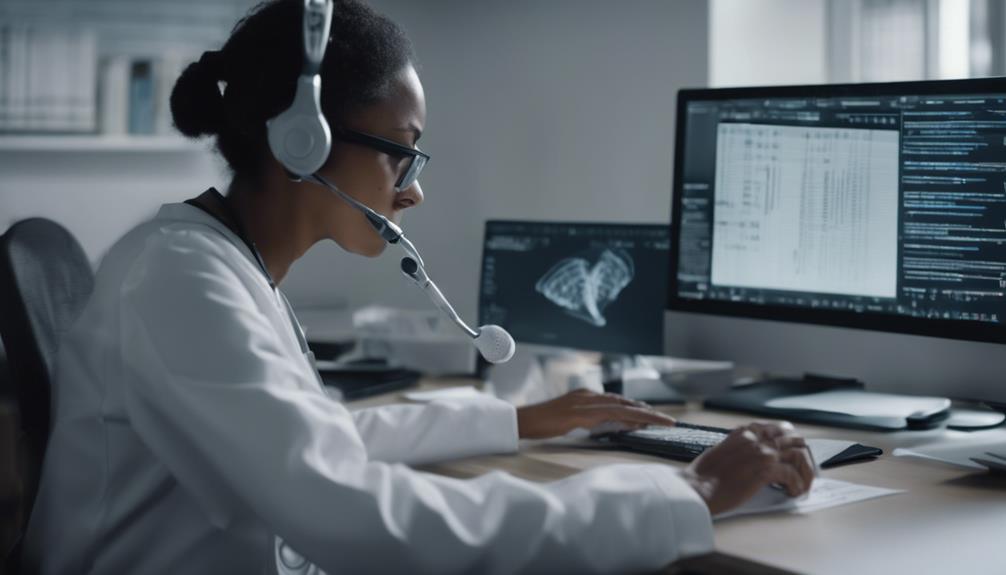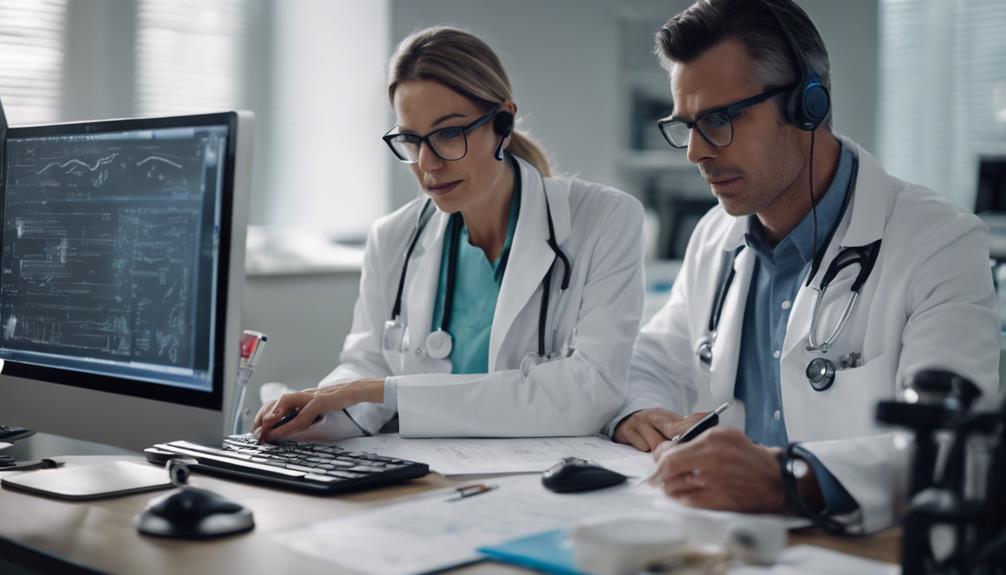Various healthcare entities, such as hospitals, private clinics, individual physicians, medical research institutions, and medical insurance companies, can benefit from a virtual assistant for medical transcription. Curious about how this technology can revolutionize your documentation processes and enhance efficiency? Let’s explore how these virtual assistants can transform the landscape of medical transcription and benefit a wide range of healthcare professionals.
Hospitals
Hospitals can greatly benefit from implementing virtual assistant technology for medical transcription, streamlining the documentation process, and improving overall efficiency. By utilizing virtual assistants, hospitals can significantly enhance hospital efficiency and ultimately elevate patient care standards.
Virtual assistants can transcribe medical notes swiftly and accurately, reducing the time healthcare providers spend on documentation. This efficiency allows medical staff to devote more time to patient care, leading to improved treatment outcomes and patient satisfaction. Moreover, with virtual assistants managing transcription tasks, there is a lower risk of errors in medical records, contributing to better-informed decision-making by healthcare professionals.
The streamlined documentation process facilitated by virtual assistants also enables hospitals to maintain more comprehensive and up-to-date patient records. This accessibility to accurate medical information enhances communication among healthcare teams, ensuring that all providers are well-informed about the patient’s condition and treatment plan. Ultimately, the integration of virtual assistant technology in medical transcription can revolutionize hospital operations, optimizing both efficiency and patient care quality.
Private Clinics
To optimize documentation processes and enhance efficiency in private clinics, implementing virtual assistant technology for medical transcription can significantly improve workflow and patient care outcomes. This advanced technology offers several key benefits tailored to the specific needs of private clinics:
- Efficiency Improvement: Virtual assistants for medical transcription can transcribe patient notes and records accurately and promptly, allowing healthcare providers in private clinics to focus more on patient care rather than administrative tasks.
- Cost Savings: By utilizing virtual assistants for medical transcription, private clinics can reduce costs associated with hiring in-house transcriptionists or outsourcing transcription services. This cost-effective solution helps clinics streamline operations and allocate resources more efficiently.
- Enhanced Accuracy: Virtual assistants ensure accurate and error-free transcriptions, reducing the risk of miscommunication or inaccuracies in patient records. This heightened accuracy can lead to improved patient care and outcomes in private clinic settings.
Individual Physicians
For individual physicians seeking to streamline documentation processes and enhance productivity, integrating virtual assistant technology for medical transcription can revolutionize daily operations. By utilizing virtual assistants for medical transcription, you can benefit from the convenience of remote work. This allows you to access transcribed documents from anywhere, enabling flexibility in your schedule and reducing the need to be physically present for transcription tasks.
Virtual assistants can significantly boost physician productivity by efficiently transcribing medical notes, freeing up valuable time that can be redirected towards patient care or personal activities. With accurate and timely transcriptions provided by virtual assistants, you can focus on delivering quality healthcare services to your patients without being burdened by the time-consuming task of manual transcription.
Incorporating virtual assistants into your workflow not only enhances efficiency but also ensures that your documentation is up-to-date and organized. This technology enables you to stay on top of your administrative tasks while maintaining a high level of accuracy in your medical records.
Medical Research Institutions
When considering the operations of medical research institutions, incorporating virtual assistant technology for medical transcription can significantly enhance research processes and documentation efficiency.
Virtual assistants can benefit medical research institutions in various ways:
- Data Analysis: Virtual assistants can transcribe and organize vast amounts of data from research studies, making it easier for researchers to analyze and derive meaningful insights efficiently.
- Clinical Trials: By transcribing data accurately and promptly, virtual assistants can assist in maintaining detailed records of clinical trials. This ensures that all information is documented correctly and can be easily accessed for future reference.
- Efficiency and Accuracy: Virtual assistants can help streamline the documentation process, allowing researchers to focus more on their analysis and findings. This improves the overall efficiency of research operations while maintaining a high level of accuracy in transcribed data.
Incorporating virtual assistant technology into medical research institutions can revolutionize how data is transcribed, organized, and utilized, ultimately leading to more efficient and effective research outcomes.
Medical Insurance Companies
How can virtual assistant technology benefit medical insurance companies in streamlining their documentation processes and enhancing efficiency? Virtual assistants can significantly aid medical insurance companies in claims processing by automating the documentation of medical records, ensuring accuracy and quick turnaround times. These virtual assistants can efficiently transcribe and analyze medical data, making the claims processing workflow more seamless and reducing the chances of errors.
Moreover, virtual assistants can play a crucial role in data analysis for medical insurance companies. By sorting through vast amounts of data quickly and accurately, these virtual assistants can help identify trends, patterns, and discrepancies in medical claims. This data analysis can lead to more informed decision-making processes and improved fraud detection measures within the insurance company.
Frequently Asked Questions
Can Virtual Assistants for Medical Transcription Work With Multiple Languages?
Yes, virtual assistants for medical transcription can work with multiple languages. They possess language translation capabilities and employ multilingual transcriptionists who ensure accurate and precise transcriptions across various languages, enhancing communication and accessibility in healthcare settings.
How Secure Is the Data Shared With Virtual Medical Transcriptionists?
When sharing data with virtual medical transcriptionists, be assured of stringent confidentiality measures. Data security is a top priority, ensuring your information is kept safe and private throughout the transcription process.
Are Virtual Assistants for Medical Transcription HIPAA Compliant?
Yes, virtual assistants for medical transcription are HIPAA compliant. Data encryption is utilized to ensure security. Remote work raises privacy concerns, but with proper measures, virtual assistants can meet HIPAA standards for safeguarding sensitive information.
Can Virtual Assistants Handle Specialized Medical Terminology?
Think virtual assistants can’t handle specialized medical terms? Think again! These savvy helpers tackle terminology challenges with ease. With proper training, they become pros in no time, making your transcription tasks a breeze.
How Are Virtual Medical Transcription Services Priced?
When considering virtual medical transcription services, pricing models vary based on factors like transcription accuracy, turnaround time, and customer support. It’s crucial to assess these elements to find the best fit for your needs.



